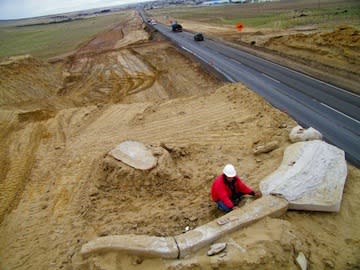 The Sideshow
The SideshowWhale fossils found in driest desert on Earth

Chilean researchers have discovered the fossilized remains of more than 75 prehistoric whales in the Atacama Desert, considered to be the driest place on the planet.
Researchers estimate that this group of whales gathered off South America's Pacific Coast more than 2 million years ago, and once they had beached and died, they melded into Chile's emerging desert landscape. More than 20 of the whale skeletons remain perfectly intact.
But archaeologists still can't say just how the whales, several of whom were roughly the size of a 25-foot school buses, ended up in the desert. "That's the top question," Mario Suarez, director of the Paleontological Museum in nearby Caldera, Chile, told the AP. The Chilean scientists have teamed up with the Smithsonian Institution to find out.
One hypothesis is that the whales became disoriented and beached themselves--at which point, natural shifts in the Earth's surface pushed their remains further from the shore over time. Other investigators suggest the whales may have become trapped in a local lagoon by a landslide or storm. "I think they died more or less at the same time," said Nicholas Pyenson, curator of fossil marine mammals at the Smithsonian's National Museum of Natural History. Pyenson and Suarez are jointly leading the research.
Along with the whale fossils, the researchers have also discovered the skeletal remains of an extinct aquatic sloth, a seabird with a 17-foot wingspan, a sperm whale and a now-extinct dolphin with two walrus-like tusks. "We're very excited about that," Pyenson said in a telephone interview with the AP. "It is a very bizarre animal."
"In the first week, about six or seven whales appeared," Suarez said. "We realized that it was a truly extraordinary site. We have a unique opportunity to develop a great scientific project and make a great contribution to science," he said.

